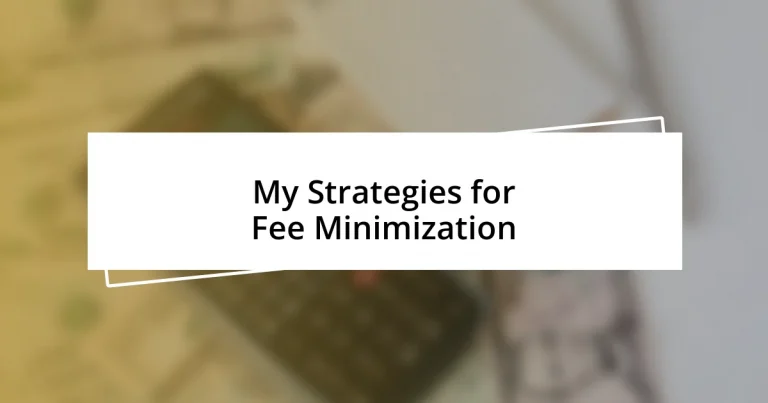Key takeaways:
- Understanding and actively managing different types of fees can unlock significant savings and enhance overall financial returns.
- Utilizing fee-free banking options and negotiating services can greatly minimize costs and improve financial satisfaction.
- Regularly evaluating the long-term impact of fees on investments is essential for maintaining financial health and achieving savings goals.
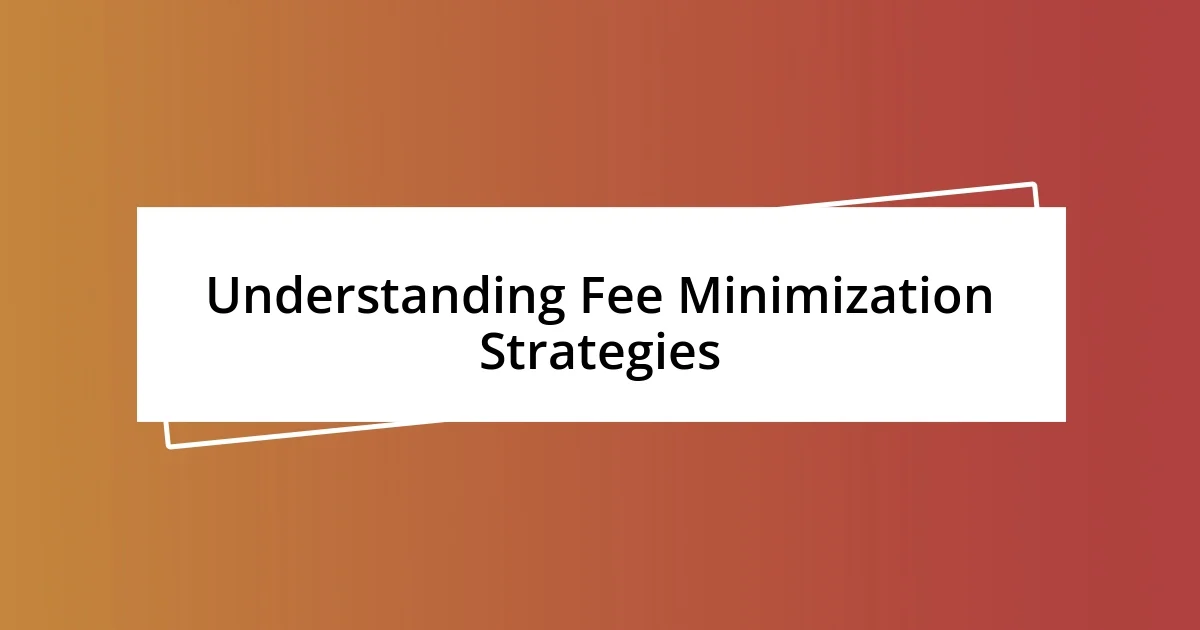
Understanding Fee Minimization Strategies
When I first started delving into fee minimization strategies, I felt overwhelmed by the sheer number of options out there. It’s like standing in a grocery store with a hundred types of pasta—how do you pick the one that’s right for you? I discovered that understanding the types of fees involved—like service charges, management fees, and transaction fees—was crucial to narrowing down my choices.
One strategy that really resonated with me is the idea of bundling services. For instance, I once worked with a financial advisor who offered a package deal that lowered my overall fees significantly. I often think about how this approach can not only save money but also simplify my financial life. Have you ever experienced the joy of getting a better deal by strategizing your services together?
Ultimately, learning about fee minimization felt like unlocking a treasure chest of opportunities. It’s empowering to know that by actively managing fees, you can enhance your overall returns. By being proactive and informed, I found that small adjustments in how I approached fees led to substantial savings over time. Isn’t it rewarding to think about how a little effort can yield such significant results?
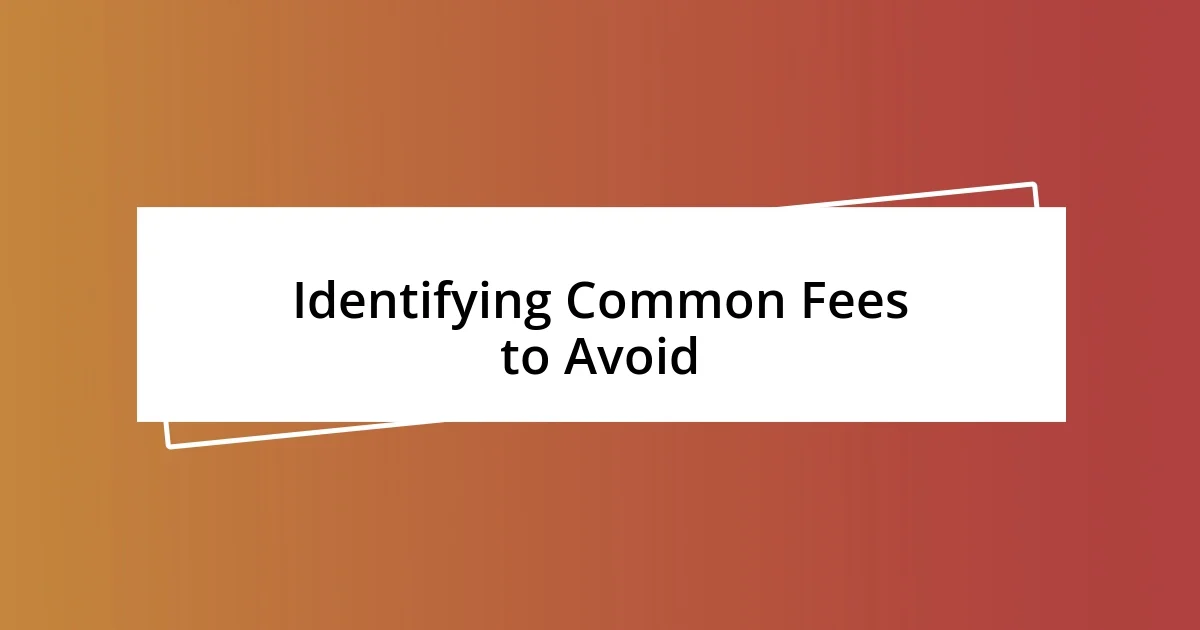
Identifying Common Fees to Avoid
Identifying common fees to avoid is crucial in maintaining control over your finances. I remember when I first began my investment journey; I was shocked to discover the hidden fees that chipped away at my returns. A simple realization that awareness is my best defense transformed the way I approached my financial decisions.
Here are some common fees you should be wary of:
- Account Maintenance Fees: Monthly charges for maintaining your account, which can often be waived if you meet certain conditions.
- ATM Fees: Fees charged for using out-of-network ATMs; seeking banks with a wide network can help avoid these.
- Foreign Transaction Fees: Charges that accumulate when making purchases abroad; consider cards that waive these fees for better travel savings.
- Early Withdrawal Penalties: Fees incurred for taking funds out of accounts like CDs before their maturity; being mindful of terms can help prevent these surprises.
- Commission Fees: Costs associated with buying and selling investment products; opting for a commission-free broker can save you a significant amount over time.
Awareness of these fees can lead to thoughtful decisions, enhancing financial health and laying the groundwork for more effective strategies. Reflecting on my experiences, I find that proactively avoiding these pitfalls has made a remarkable difference in my investment outcomes.
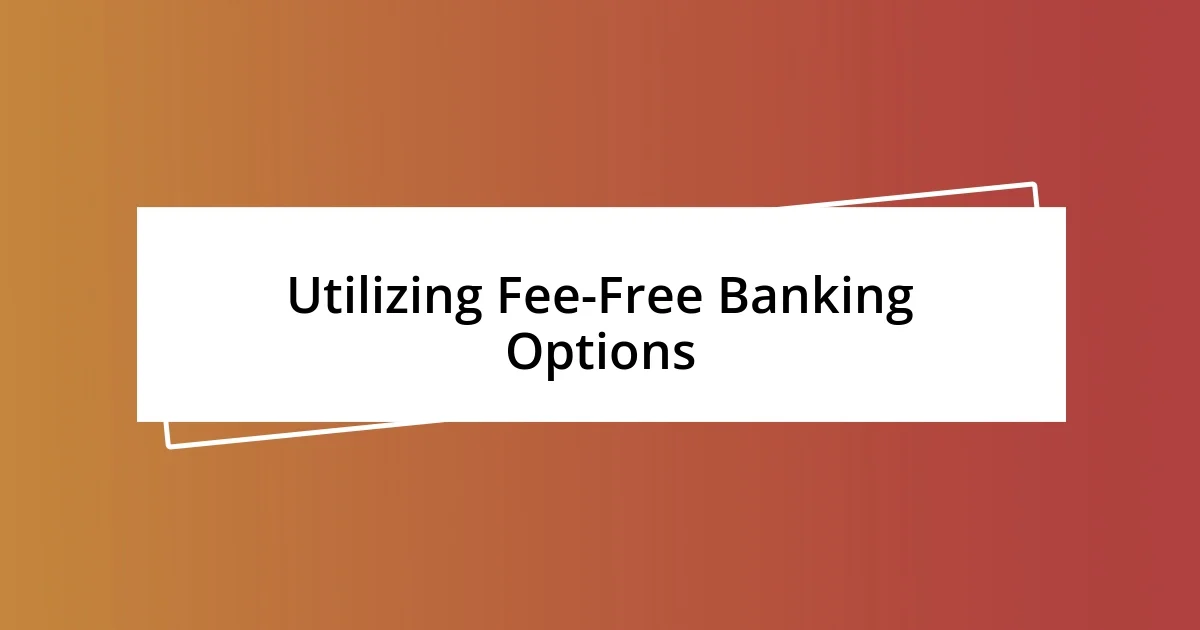
Utilizing Fee-Free Banking Options
Utilizing fee-free banking options has been a game changer for me. Initially, I was skeptical about switching to fee-free accounts, but once I made the leap, it drastically improved my banking experience. I remember opening an account with a credit union that promised no monthly maintenance fees and free access to ATMs. It felt incredibly liberating not to watch my hard-earned money disappear in fees each month.
Exploring online banks was another avenue that proved rewarding for me. The competitive nature of these banks often leads to lower fees, better interest rates, and even higher convenience with user-friendly apps. I can’t help but think back to the excitement I felt when I first transferred my savings to an online bank with a no-fee policy. It not only optimized my savings but also brought a sense of satisfaction that I was making smart financial choices.
The advantages of fee-free options don’t stop there. Many banks offer features like cashback rewards and higher interest on savings when you avoid traditional banking fees. I recall making a purchase with my debit card that earned cashback without any charge attached—what a delightful surprise! It became a reminder that going fee-free not only conserves money but can also enhance financial benefits. Isn’t it great to find options that align with both our goals and our values?
| Bank Type | Key Features |
|---|---|
| Credit Unions | No monthly fees, local service, community involvement |
| Online Banks | Higher interest rates, minimal fees, convenient access |
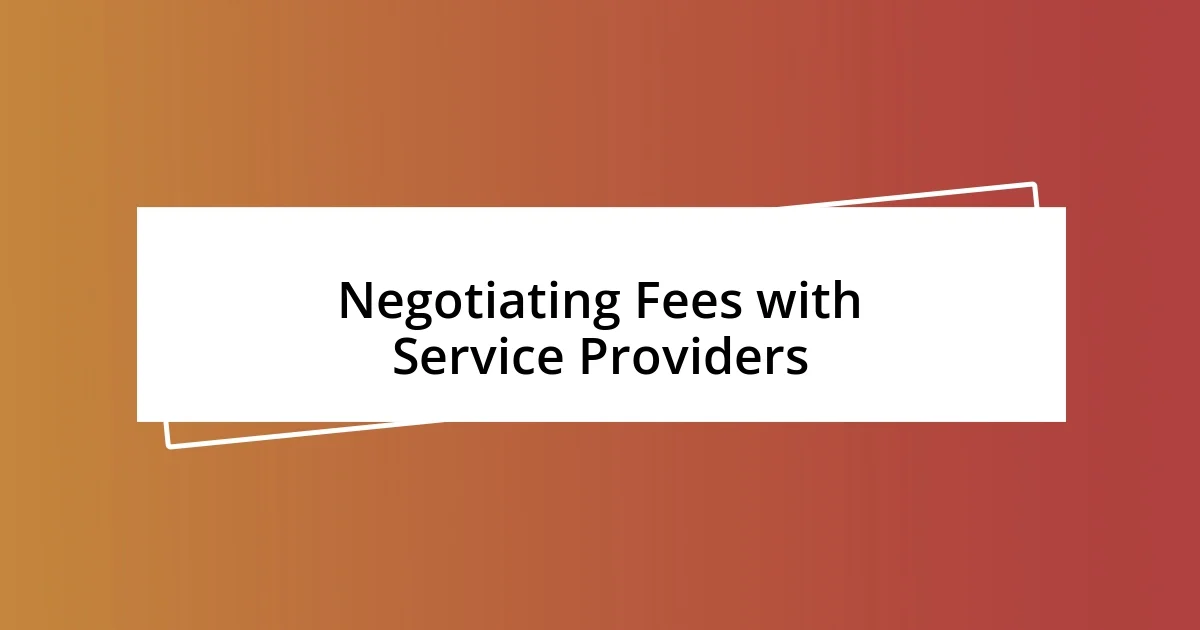
Negotiating Fees with Service Providers
Negotiating fees with service providers can feel daunting, but it’s an opportunity to advocate for yourself. Not too long ago, I was faced with a hefty service fee from a provider that seemed unjustified. Gathering my thoughts, I approached their customer service with a clear mindset and a list of competing offers in hand. Being well-informed shifted the conversation in my favor, and I ended up saving significant money.
One key strategy I’ve found effective is to ask directly about available discounts or fee waivers. I remember feeling nervous the first time I asked for a reduction on a subscription service, but to my surprise, they were more than willing to negotiate. This experience taught me that simply asking the question can lead to unexpected and favorable results—after all, what’s the worst they can say?
Building a rapport with service providers can also pave the way for better negotiations. During a recent conversation with my internet provider, I took a moment to connect on a personal level, sharing a light-hearted comment about our town’s internet struggles. It was refreshing, and to my delight, this friendly approach led to a discount on my monthly fee! I often wonder: how often do we underestimate the power of a genuine conversation in business?

Leveraging Technology for Fee Tracking
Tracking fees can be so much simpler with the right technology at your fingertips. I’ve had tremendous success by using budgeting apps that automatically categorize my expenses, including any fees that pop up. It’s eye-opening to see where my money goes, and the insights from these apps have helped me recognize patterns and areas where I can cut back.
One specific instance I recall was when I started using a financial tool that sent me alerts whenever a transaction encountered a fee. This real-time feedback was invaluable! It not only allowed me to address any unexpected charges quickly but also encouraged me to stay vigilant in managing my finances. Have you ever been surprised by a fee you didn’t notice until it was too late? I know I have, and I wish I had that technology back then.
Moreover, leveraging online banking platforms with built-in fee tracking features has given me a clearer picture of my finances. I remember vividly when my bank introduced a dashboard that openly displayed my monthly fees. It was such a relief to see everything in one place, allowing me to strategize for the month ahead. This transparency fosters a sense of control, making fee minimization not just a task, but an engaging part of my financial journey.
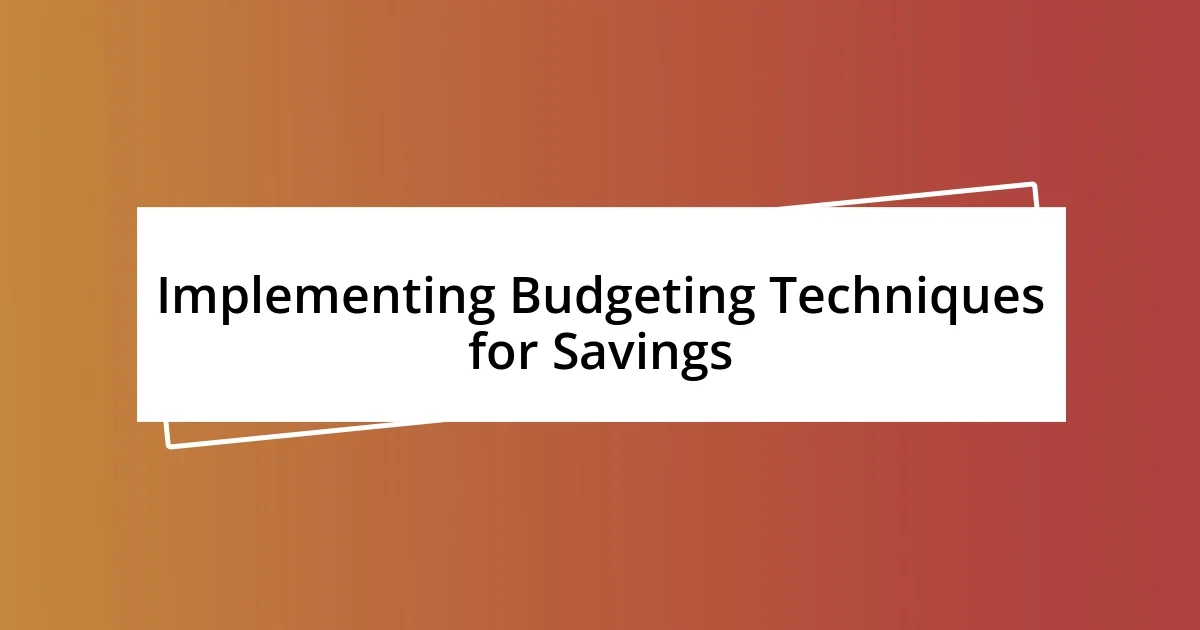
Implementing Budgeting Techniques for Savings
Implementing budgeting techniques has played a transformative role in how I manage my finances. I remember when I started using the envelope system for my discretionary spending. Each month, I allocated a specific amount to different categories like dining out, entertainment, and groceries, placing cash into labeled envelopes. This not only made me more aware of my spending but also created a tangible connection to my budget, preventing me from overspending. Have you ever felt that rush when you stick to your budget? It’s a rewarding experience!
Another strategy that I’ve embraced is rolling over any unspent money from one category to the next month. At first, I was skeptical—could I really trust myself not to dip into those funds? But when I ended up with extra cash in my dinner envelope, I felt a mix of pride and excitement. It was like a mini windfall! This approach taught me that savings can be just as important as expenses, creating a buffer that inspires more responsible spending.
I also find it incredibly valuable to review my budget weekly. In my early days of budgeting, I’d only check in once a month, and let me tell you, that often led to surprises I wasn’t prepared for. Now, I set aside time every Sunday to assess my spending habits and tweak my budget for the week ahead. It keeps me accountable and establishes a routine that feels manageable and proactive. Isn’t it fascinating how a little discipline can lead to profound savings?
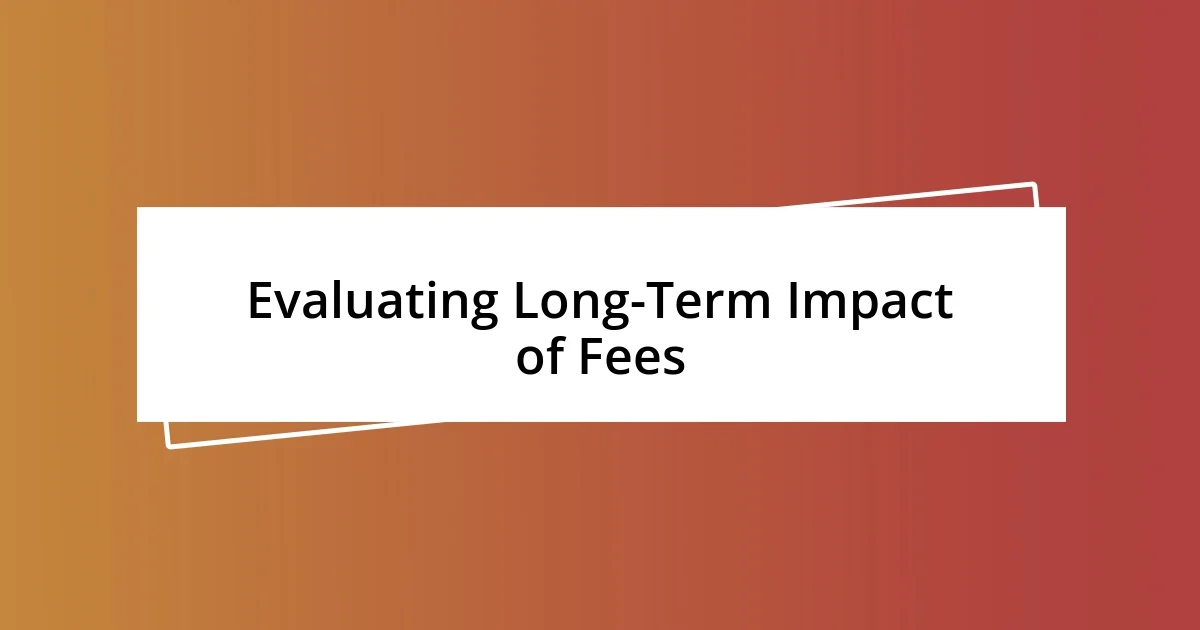
Evaluating Long-Term Impact of Fees
Evaluating the long-term impact of fees is essential in shaping one’s financial future. I recall a time when I faced unexpected investment fees that seemed small at first. However, over the years, these fees accumulated to an astonishing amount, reducing my overall growth significantly. Have you ever thought about how even minor fees add up? It’s startling to realize how they can compromise your financial goals long-term.
When I took a closer look at my retirement accounts, I discovered a fee structure that was eroding my potential savings. This prompted me to switch to a low-fee provider, which not only boosted my account balance but also provided a sense of relief. The realization hit me hard: a small change can lead to massive benefits over time. It’s enlightening how reevaluating my fee structure made my investment journey so much more rewarding.
As I continue to assess my finances, I can’t help but appreciate the power of regular evaluations. I’ve learned to schedule annual reviews of my fees, much like an important health check-up. This practice has opened my eyes to new opportunities and reinforced the idea that fees are not just numbers on a statement—they directly impact my financial well-being. How often do you review your fees? Trust me, it’s a habit worth cultivating!












